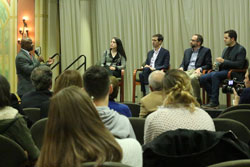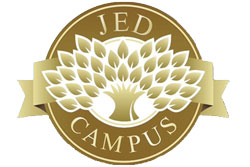Panelists included Aaron Katersky who is an award-winning ABC News correspondent based in New York, Ben Moskowitz who teaches the Interactive Telecommunications Program at NYU’s Tisch School of the Arts, Brian Carovillano who is the Vice President for U.S. News at The Associated Press in New York, and Hadas Gold who is a reporter at POLITICO. The moderator was Hollis R. Towns, the current Executive Editor and Vice President of the Asbury Park Press as well as the regional editor of Gannett New Jersey.
“MOCC thought it was important to do a #coMmtalks event because this election was so controversial,” said Stephanie Brady, senior communication student and President of MOCC. “Politics can sometimes be awkward for students to talk about. We wanted to have an event where we could get students involved and discussing something so important: the election,” said Brady.
Hollis opened the discussion with the question, “what happened?” The panelists all had different responses to this question. This was followed by an open question and answer segment between students, faculty, and panelists.
Gold explained that Trump supporters did get coverage, but that this coverage did not get enough attention. “While there have been arguments that the media missed the white voter in the suburbs, there was coverage of that and we see that when you look back at it, it just didn’t get as much attention,” said Gold.
The accuracy of exit polls was also analyzed. “I think we need to be careful about this question of what happened because we don’t really know. The exit polls this year were more flawed than ever. We don’t really know that 26 percent of Latinos voted for Donald Trump, those are just exit polls,” said Carovillano.
There was a discussion about the actual messages from each candidate and whether their messages were effective. “Donald Trump is a TV celebrity who has over 24 million people watching him every night, no other politician has ever had that. The other thing was that he had a message. What does Donald Trump stand for? Make America Great Again, build the wall, drain the swamp. But what was Hillary Clinton’s message? Stronger Together was almost meaningless,” said Moskowitz.
Gold described how Millennials were not excited about voting this year, which affected the election in the end. “It is a lot easier to get yourself up and out of bed for something you are excited about than something you are scared about,” she said.
Polling became a large aspect of the 2016 election. Katersky described how the purpose of polling and how sometimes they can be relied on too much, “…is not to tell you who wins the purpose of polls is to tell you why people vote.”
There has also been recent talk about the White House Press Corps and whether or not there will be one during the Trump Presidency. Gold explained how she thinks there will be a White House Press Corps. She described how Donald Trump craves attention and that he will likely walk into that press room more often than any other president. However, Gold mentioned that some news organizations may be blocked from the press room from time to time.
Overall, the purpose of the event was for students and faculty to better understand the 2016 election. “I would hope that students would gain a deeper appreciation for the complexity of news media and American politics,” said Claude Taylor, () who attended the event. “I think it was valuable for students to hear analysis about what we can know and what is difficult to clearly understand when it comes to predicting elections and measuring public opinion. Any of the students who plan to work in news media were exposed to some important insights.”
“The thing I took away was that the media just straight up got it all wrong this election cycle, and that readers and viewers must not continue to take things at face value,” said Hunter Farman, senior communication student and general manager at WMCX 88.9 FM. He continued, “…as someone who has followed the election like crazy from the start, it was really interesting to hear people in the mainstream media try to figure it all or even though it seemed as though they were all as confused as the rest of us,”
“My favorite part of the event was getting to meet each panelists personally beforehand, and then hearing what they had to say during the event. Each of them had such different perspectives because of where they work so it was extremely interesting to hear their different sides,” said Brady.
The event was sponsored by The Department of Communication, the Communication Council, and the MOCC.
PHOTO COURTESY of Angela Ramos



